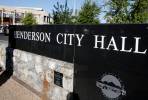Good bills die at deadline
Plenty of bad bills died in Carson City on Friday, when the Legislature came to the first of several deadlines designed to move legislation through the process. We can all be grateful, for example, that we won't have to pay a 5-cent fee when we buy a Big Mac, pay sales tax when we buy a bottle of water, or face criminal penalties for bullying.
Sadly, however, more than a few good bills died, too.
For example, how many times have you driven past a "construction zone" in which a lane or two has been blocked off, snarling traffic, but there's not a single construction worker present? These phantom construction zones appear on surface streets and freeways alike, as contractors block off lanes for hours, days or weeks when there's no real need to do so.
Assembly Bill 275 by Assemblyman Tick Segerblom would have prevented that, by requiring contractors to remove barriers when there's no work scheduled. It would have imposed hefty fines starting at $1,000 and rising to $10,000 for a third violation, whereupon that particular contractor would be disqualified from bidding on public works jobs.
The measure could have eased commutes for thousands of people in Southern Nevada, but alas met a legislative roadblock and died.
Another Segerblom bill -- Assembly Bill 159 -- may seem to be of interest only to the media. It would have limited government copying fees to 10 cents per page. Currently, some agencies charge $1 per page, and as much as $3 per page, to any reporter or member of the general public who asks for copies of public records.
The fees are not only outrageous (state law currently says copying fees " must not exceed the actual cost to the governmental entity to provide the copy ") but they prevent journalists, activists and regular Nevada citizens from gaining access to government records. (In fact, it's worse for regular citizens, who don't have a news organization's resources when seeking to obtain public records.)
Even more egregious -- and something for Segerblom to consider for next session -- is the more recent trend of government agencies charging fees simply to collect records that state law says must be open to inspection. News organizations and policy research centers have been hit with hefty fees just to look at records, another unacceptable barrier to holding government accountable.
Assemblyman Ed Goedhart's proposal to impose a two-year cooling off period before elected officials could return to Carson City as paid lobbyists -- Assembly Bill 184 -- failed to advance, but similar language is found in Assembly Bill 452.
That measure, which also requires electronic filing of campaign contribution reports, passed by Friday's deadline. Let's see if it survives to the end of the session intact, given the fact that it may be cutting off the future (and much more lucrative) livelihood of current lawmakers.
Several bills that would have required photo identification before a person could vote also went down to defeat. Currently, a voter only has to show up, give his or her name and sign a log book next to a scanned image of his or her signature already on file with the county. (But bills to allow same-day voter registration, eliminate early voting and move the primary election from June to September all died, which is a good thing.)
And Segerblom's proposal to combine off-year municipal elections with even-year elections is still alive, too.
Oh, and one more thing: Senate Bill 298, which allowed for investigation of complaints of "noxious odors," died at the deadline, so downtown visitors will just have to live with it for another two years.
Steve Sebelius is a Review-Journal columnist, and author of the blog SlashPolitics.com. His column appears Sunday, Tuesday, Wednesday and Friday. Reach him at 387-5276 or at SSebelius@reviewjournal.com.























